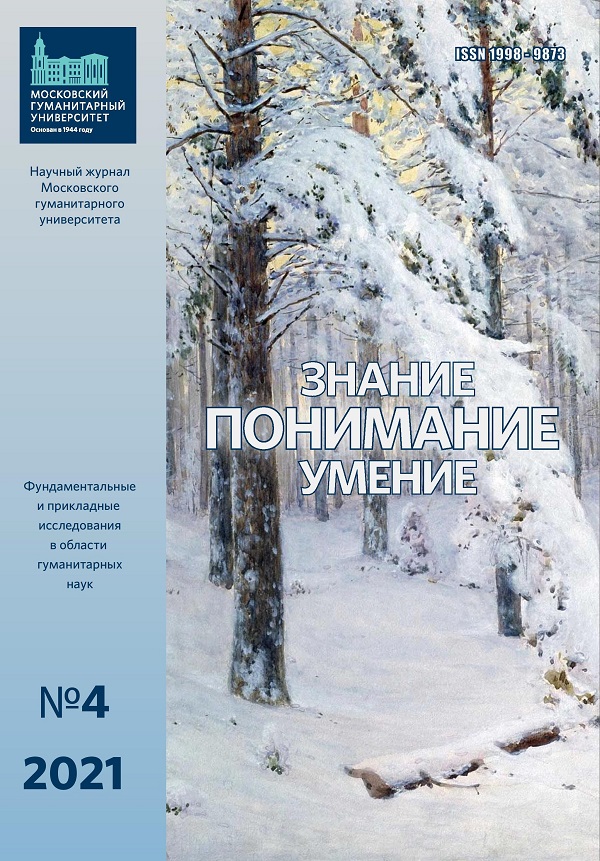Main page / "Knowledge. Understanding. Skill" Journal / Contents / 2012 / No. 2
Tikhomirova T. N., Kovas Yu. V. The Role of Cognitive Characteristics in Mathematical Achievement in Russian High School Students
The research paper is written with the financial support of the Ministry of Education and Science of the RF (state contract №02.740.11.5210; project executive — A. L. Zhuravlev).
(The Institute of Psychology of the Russian Academy of Sciences),
(The University of London)
Abstract ◊ The paper reports an empirical analysis of various aspects of number sense, characteristics of visuo-spatial memory and the speed of information processing, assessed with an original web-based battery of tests, as well as their correlation with the mathematical achievement.
Keywords: number sense, visuo-spatial memory, speed of information processing, mathematical achievement, high-school age.
Tikhomirova Tatiana Nikolaevna, Candidate of Science (psychology), senior researcher at the Institute of Psychology of the Russian Academy of Sciences. Tel.: +7 (495) 683-45-35. E-mail:
tikho@mail.ru
Kovas Yulia Vladimirovna, PhD (behavioral genetics), the director of the International Laboratory for Interdisciplinary Investigations into Individual Differences in Learning, Goldsmiths, University of London. Tel.: +44 (0) 207-078-50-25. E-mail:
kovas@gold.ac.uk

Citation: Tikhomirova T. N., Kovas Iu. V. Rol' kognitivnykh pokazatelei uchashchikhsia starshego shkol'nogo vozrasta v uspeshnosti resheniia matematicheskikh zadanii // Znanie. Ponimanie. Umenie. 2012. № 2. S. 237–244.
RUSSIAN VERSION
BIBLIOGRAPHY
Bull, R., Johnston, R. S., Roy J. A. (1999) Exploring the Roles of the Visuo-Spatial Sketch Pad and Central Executive in Children’s Arithmetical Skills: Views from Cognition and Developmental Neuropsychology // Developmental Neuropsychology. Vol. 15. No. 3. P. 421–442.
Butterworth, B., Varma, S., Laurillard, D. (2011) Dyscalculia: From Brain to Education // Science. Vol. 332. No. 6033. P. 1049–1053.
Dehaene, S. (1997) The Number Sense. New York : Oxford University Press.
Dehaene, S., Dupoux, E., Mehler, J. (1990) Is Numerical Comparison Digital? Analogical and Symbolic Effects in Two-digit Number Comparison // Journal of Experimental Psychology: Human Perception and Performance. Vol. 16. No. 3. P. 626–641.
Greven, C. U., Harlaar, N., Kovas, Y., Chamorro-Premuzic, T., Plomin, R. (2009) More than Just IQ: School Achievement Is Predicted by Self-perceived Abilities — but for Genetic Rather than Environmental Reasons // Psychological Science. Vol. 20. No. 6. P. 753–762.
Halberda, J., Feigenson, L. (2008) Developmental Change in the Acuity of the "Number Sense": The Approximate Number System in 3-, 4-, 5-, 6-year-Olds and Adults // Developmental Psychology. Vol. 44. No. 5. P. 1457–1465.
Halberda, J., Mazzocco, M. M., Feigenson, L. (2008) Individual Differences in Nonverbal Estimation Ability Predict Maths Achievement // Nature. Vol. 455. P. 665–669.
Inglis M., Attridge, N., Batchelor, S., Gilmore, C. (2011) Non-verbal Number Acuity Correlates with Symbolic Mathematics Achievement: but Only in Children // Psychonomic Bulletin & Review. Vol. 18. No. 6. P. 1222–1229.
Pagulayan, K. F., Busch, R. M., Medina, K. L., Bartok, J. A., Krikorian, R. (2006) Developmental Normative Data for the Corsi Block-Tapping Task // Journal of Clinical and Experimental Neuropsychology. Vol. 28. No. 6. P. 1043–1052.
Semmes, R., Davison, M. L., Close, C. (2011) Modeling Individual Differences in Numerical Reasoning Speed as a Random Effect of Response Time Limits // Applied Psychological Measurement. Vol. 35. No. 6. P. 433–446.
Siegler, R. S., Opfer, J. E. (2003) The Development of Numerical Estimation: Evidence for Multiple Representations of Numerical Quantity // Psychological Science. Vol. 14. No. 3. P. 237–243.
|
|
|
 The No. 4 2021 of the
The No. 4 2021 of the
Journal "Knowledge.
Understanding. Skill"
is issued
|
|
|
|